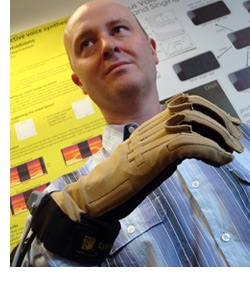Voice control research with Canada's UBC
Thu, 24 Nov 2011 15:46:00 GMT
Sound ideas
 A University of Huddersfield expert in music technology has teamed up with colleagues across the Atlantic to help speed up an important breakthrough in sound production with possible applications in artificial speech, singing and control of electronic music. The project uses a variety of tools such as a body suit and devices such as Apple’s iPad and iPhone.
A University of Huddersfield expert in music technology has teamed up with colleagues across the Atlantic to help speed up an important breakthrough in sound production with possible applications in artificial speech, singing and control of electronic music. The project uses a variety of tools such as a body suit and devices such as Apple’s iPad and iPhone.
Dr Ian Gibson - pictured wearing a glove that can be used to control sound - is a senior lecturer in music technology at the University’s School of Computing and Engineering. He is now a visiting associate professor at the University of British Columbia (UBC), one of the world’s highest rated institutions.
During 2011, Ian spent three months at UBC, working on a major project revolving around new methods of controlling sound. He plans to rejoin the team in 2012 where he will work on novel interfaces for music and communication using iPad and iPhone.
One aim of the Canadian team is to produce a suit that would enable the wearer to communicate through gesture – for example by converting sign language into spoken word. Another goal is to develop the project to a level where the wearer could communicate with people in everyday life. Dr Gibson is working with a part of this project related to the production of sound.
The project chimes closely with Ian’s own areas of research. For example, he has investigated methods of using the human voice to control electronic instruments. He has also examined ways of capturing elements of a person’s voice and using them to synthesise sound. His techniques enable a singer to sing in much higher or lower registers without losing the distinctive timbre of their voice.
It is his expertise in novel methods to control electronic sounds that has gained Ian his prestigious associate professorship. Widely known for his presentations at global conferences, it was while he was visiting family in Canada that he was introduced to members of the renowned music faculty at the University of British Columbia, and it was quickly realised that he had a lot to offer the research project.
The field of research has both practical and artistic dimensions. For example, the body suit that would synthesise speech or singing could aid a person with vocal disabilities. But there are massive creative possibilities too, for the suit could allow the wearer to create electronic music.
“You are effectively using your whole body to play an instrument,” said Ian, whose areas of expertise include electronic composition and developing sonic art installations.
He hopes that his continuing role as a visiting professor will establish a long-running relationship and Ian aims to explore the possibility of other links between the universities of Huddersfield and British Columbia.
“The Canadian Higher Education system is very strong and focussed, and some Canadian universities are becoming world leaders in the field of Music Technology.”





 Print This Page
Print This Page